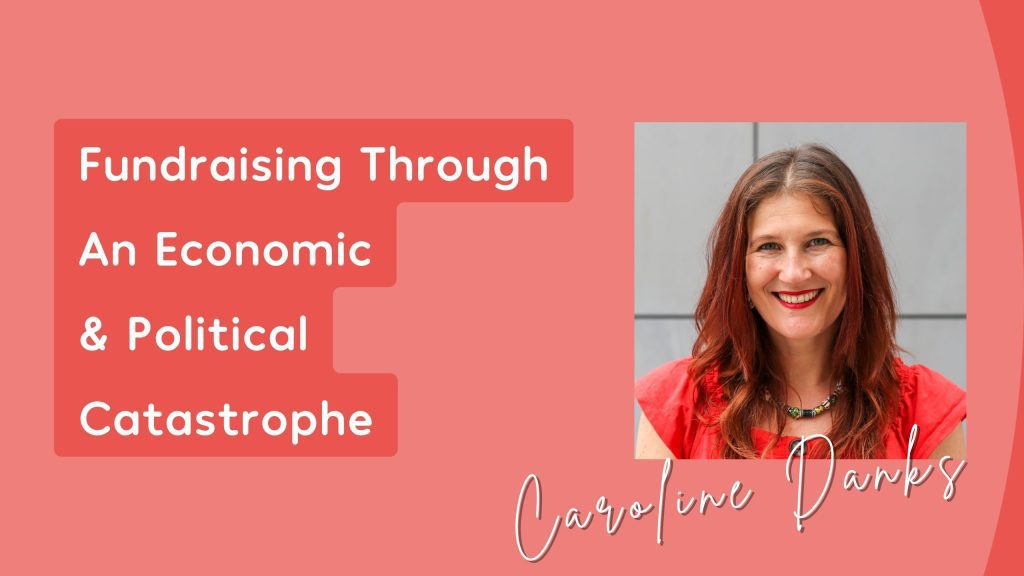Stress Awareness Day falls this week, and we will likely see content about stress, and coping strategies.
Most of us are all too aware of stress, which the HSE defines as ‘the adverse reaction people have to excessive pressures or other types of demand placed on them’.
Fundraisers are part of a charity ecosystem that has never had a greater need to innovate, adapt, and deliver. We need to ‘do more, with less’. We need to be ‘resilient’. Many fundraisers need to be and do that with little support and development, within existing, or dwindling resources, whilst facing structural discrimination, inequality, or harassment, and in the context of difficult workplace relationships.
To solve the challenges that we face, we want to be at our best.
We should be able to look up and out with confidence to see opportunities on the horizon, and able to support those we lead with directness and empathy.
Awareness days and ‘moments’ can be helpful in drawing attention to a topic, but when it comes to promoting good mental health and preventing psychological injury at work, there needs to be sustainable action year-round.
This is a different blog to many you might read.
Yes, there are some tips for things you might do to build your resilience where you can, but it’s more about what organisations can and should be doing to change the nature of work to make our profession sustainable and successful.
The things we can do ourselves.
Social feeds always seem to be full of things we can do to change our world or live our best life. If we are powerless to change our circumstances, it can seem like this kind of content mocks our challenges or leans into a privilege we don’t have.
That said, most of us can find small steps to take, both as acts of self-care in challenging times and as part of more sustainable habits to bring to our work and lives.
Getting the basics in place can make a big difference especially when things are hard. Could your sleep be better? How’s your diet? Are you drinking enough water? What about getting outside in the light, or getting some exercise?
Recently the Mental Health Foundation published a new set of evidence-based tips for looking after your mental health and whilst some may seem obvious, it’s amazing how often we forget them.
It can be hard to find time, or money to do the things we’d like, so where employers can support and incentivise these activities with employee benefits, it can be a big help. We also need to understand that not everybody can adopt these strategies without help and support.
Of course, when we are in it, and up against it, stress, burnout and overwhelm are awful things to experience and it can be hard to imagine how we can change things for ourselves. When our mental health is challenged our minds often take us away from things that might help but seem counter intuitive – like exercise. We can also judge ourselves very harshly, so working on self-compassion skills in better times can really help. The Overwhelm First Aid Kit is a good resource to have on hand if you often find that you don’t know what the next step could be.
You may find that your employer offers an employee assistance programme which can be helpful in accessing counselling, or that you have access to benefits like this through a spouse’s employer, insurance or health plan. Samaritans is open 24/7, every day of the year, and you can call for free on 116 123.
What do leaders and organisations need to consider?
Managers, leaders, and boards need to be aware of their duties under the law, and the wider implications for performance, staff engagement, recruitment, and retention of talent in not acting.
As a sector, we often build out around the mission without the policies, systems and structures that enable organisations to function effectively when they grow. Passion and commitment often drive us forward and can help us cope with challenges – but dedication can also lead to our people going beyond or being pushed beyond their boundaries and into stress or burnout.
Burnout itself is often seen as a personal issue, but it has been categorised by the World Health Organisation as a “syndrome conceptualised as resulting from chronic workplace stress that has not been successfully managed.” Because so many of the factors that lead to workplace stress can’t be changed by individuals alone, or mitigated by simple solutions, burnout is very definitely an organisational challenge requiring organisational efforts to prevent.
So where to start?
All strategy starts with a clear definition of where you want to get to – which for most charities will be sustainable delivery of the charitable objects and mission.
Sustainability has often been about funding, and more recently also about environmental impact – but sustainability also includes supporting the major asset of most charities – the people who deliver the work.
Psychological safety is a term coined by Professor Amy Edmondson from Harvard Business School and it is key for fundraisers to succeed. Psychologically safe cultures create a space where people feel safe to speak up, take risks and learn from mistakes.
If you think about it, that’s where the gold lies in terms of high performance – Edmondson calls this the learning zone – where we are pushed by high standards and accountability but balanced by the safety and security to speak up, be heard, and grow.
Getting there is far from simple, but the reward can be huge.
A good place to start is with the fundamentals of good management. Line management relationships are crucial to workplace wellbeing, and it is crucial that people managers have the training and support they need to do that alongside the ‘delivery’ components that are asked of them.
As a supervisor, managing for good mental health might include ensuring that your team know what is expected of them, can see their efforts paying off, and sees you consistently applying the policies and processes in your organisation. It means receiving and acting on concerns and having difficult conversations directly but with kindness. It means building your self-awareness, setting boundaries, and committing to people management as a privilege and not a chore.
As a senior manager, it could mean committing to assess and manage stress risk by using the HSE stress risk assessment framework, putting a wellbeing metric on your board dashboard, or ensuring that your policies and procedures are inclusive, applied, and create minimal drag or dependencies. It could mean introducing a coaching programme, or employee benefits.
Leadership is more about values – showing integrity, and inspiring trust. Leadership isn’t always about job titles that loads of amazing movements for change and improved wellbeing – like #showthesalary, #charitysowhite and #charitysostraight have come out of collaborations at all levels.
As leaders, we need to understand our values, and how they blend with those of the organisation. If we commit to leading by example asking people to push themselves to new heights, then we must be prepared to grow and change and we must deliver what we say we will. We must also model the behaviour we want to see. We may even need to reimagine the way charities operate to truly meet the challenges people face – and therefore deliver sustainable impact to beneficiaries.
Wherever we are personally or organisationally, there’s a lot of good information, and good work happening in this field, and there are huge opportunities for peer networks and sharing of ideas.
Fundraising Everywhere also has an amazing new leadership programme for existing and aspiring leaders, which includes access to great content and free coaching taster sessions. Check it out.







